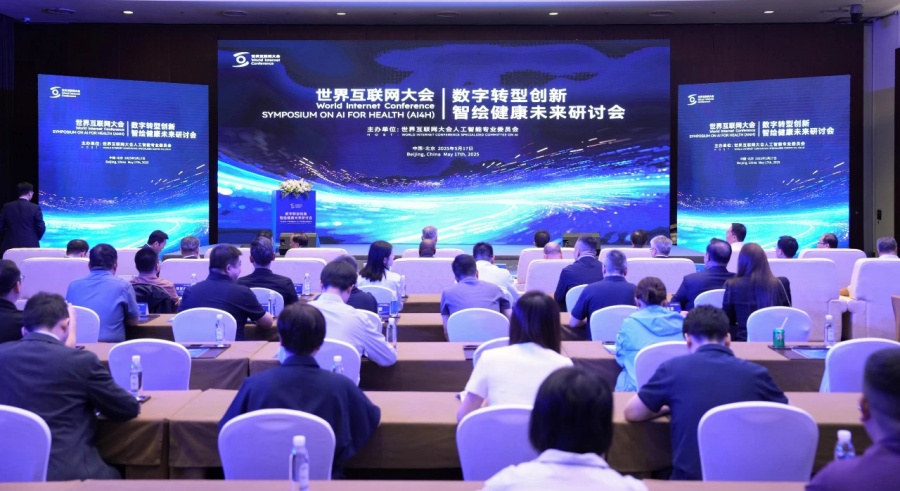
- Home
- Media Center
-
Events
- Wuzhen Summit
- Regional Forums
- Practice Cases of Jointly Building a Community with a Shared Future in Cyberspace
- World Internet Conference Awards for Pioneering Science and Technology
- The Light of Internet Expo
- Straight to Wuzhen Competition
- Global Youth Leadership Program
- WIC Distinguished Contribution Award
- Membership
- Research & Cooperation
- Digital Academy
-
Reports
- Collection of cases on Jointly Building a Community with a Shared Future in Cyberspace
- Collection of Shortlisted Achievements of World Internet Conference Awards for Pioneering Science and Technology
- Reports on Artificial Intelligence
- Reports on Cross—Border E—Commerce
- Reports on Data
- Outcomes of Think Tank Cooperation Program
- Series on Sovereignty in Cyberspace Theory and Practice
- Other Achievements
- About WIC
- 中文 | EN

WIC symposium charts AI impact on healthcare
The intersection of artificial intelligence and healthcare took center stage at the "AI for Health" symposium held on Saturday at the National Convention Center in Beijing. Organized by the Specialized Committee on Artificial Intelligence (SC on AI) of the World Internet Conference (WIC), the event was attended by representatives from government departments, international organizations, leading domestic medical institutions, research institutes, and smart healthcare enterprises.
Wang Jingtao, Deputy Director of the Cyberspace Administration of China, opened the symposium by highlighting how AI is fundamentally changing the way people work and live. He emphasized China's commitment to self-reliance in AI development with a focus on practical applications, noting that China has already registered 404 generative AI services.

Martin Taylor, WHO Representative to China, said the World Health Organization views AI as a tool of enormous potential for healthcare. He stressed that AI applications must be safe and equitable, noting that the WHO has made digital health and AI a strategic priority. Taylor also said the WHO has issued guidance on the ethics and governance of AI in healthcare to help ensure responsible implementation.
Several speakers referenced China's "Health Industry Artificial Intelligence Application Scenarios Reference Guide," issued by the National Health Commission in November 2024. This national-level framework has become an essential roadmap for AI implementation in healthcare, covering 4 major domains and 13 categories with 84 specific application scenarios. The comprehensive guide has significantly accelerated the adoption of AI technologies by providing clear direction for both healthcare providers and technology developers.
Wang pointed to impressive AI applications in healthcare, such as the intelligent pathology system developed by Shenzhen People's Hospital and Tsinghua University, which achieves 97% diagnostic accuracy. He also mentioned Peking University's infectious disease prediction system that successfully forecasted flu peaks 7-10 days in advance during the 2024 flu season.

According to market analysis shared at the symposium, the global AI application market is projected to reach $127 billion by the end of 2025, with the medical sector accounting for approximately one-fifth of this total. This substantial market share highlights the significant role AI is playing in transforming healthcare delivery globally.
Ren Xianliang, Secretary-General of the WIC, highlighted the organization's efforts to promote responsible AI development. He noted that healthcare issues represent one of humanity's ultimate challenges, requiring the international community to pool resources and work together.
Yang Dungan, Secretary of the Disciplinary Committee at Peking Union Medical College Hospital, detailed how the institution has deployed "Xiehe Zhishu," a comprehensive AI system based on DeepSeek's technology. The hospital currently has approximately 80 AI applications in use or under development, covering patient services, diagnostic assistance, and management.
Yang also highlighted their "Taichu" model, designed specifically for rare disease diagnosis. The Taichu model supports precise diagnosis of rare diseases with minimal data, representing a new paradigm in medical diagnostics.
Zhu Lifeng, Deputy Director of Shanghai Digital Medical Innovation Center at Ruijin Hospital, said their institution has accumulated 5 petabytes of data since beginning digitization in 1988, with annual data growth now reaching 1.5 petabytes.
Ruijin Hospital completed an impressive 1.33 million AI-assisted diagnoses last year, improving diagnostic efficiency by 58% and reducing report generation time.
Cai Xiujun, President of Sir Run Run Shaw Hospital, showcased their comprehensive "Internet+" healthcare approach. The hospital has eliminated traditional registration counters, implementing a fully digital patient journey via mobile applications.
Their liver tumor diagnosis AI system has achieved 93.6% diagnostic accuracy, equivalent to that of a radiologist with 13 years of experience, and can generate reports within three minutes after a patient completes a CT scan. This rapid turnaround dramatically improves patient experience while maintaining high diagnostic quality.
Huang Jin, Executive Vice-President of West China Hospital at Sichuan University, said the hospital has built an impressive computing infrastructure with 26 petaflops of computing power and 77 petabytes of storage to support their AI initiatives.
West China Hospital performed 2.2 million AI-powered follow-up calls last year, supporting their internet hospital services that reached over 2 million consultations in 2024.
Hou Yan, Chairman of China Medical Equipment Association, noted that the Chinese medical equipment market has grown at an average rate exceeding 12% over the past decade, reaching 1.35 trillion yuan in 2024. AI technology is deeply integrating with medical equipment, driving innovation across the industry.
The association has cataloged 76 companies developing medical AI applications and 235 companies focused on medical robotics. These technologies are finding applications in diagnostic imaging, surgical procedures, telehealth, and clinical decision support.
Chen Qixiao, Vice-President of Siemens Healthineers Greater China, said Siemens conducts approximately 1,600 AI-related experiments daily across their five global R&D centers.
Siemens has brought over 100 AI-enabled medical devices to the market and registered more than 1,000 AI-related patents. Their "Deep Resolve" technology for MRI has achieved remarkable efficiency gains, reducing scan times by 73% while maintaining or improving image quality, which significantly enhances patient comfort.
Qian Wei, General Manager of Oncology at Roche Pharmaceuticals China, emphasized that patient benefit should be the ultimate goal when implementing AI in healthcare.
Min Dong, Deputy Director of the Cloud Computing and Big Data Research Institute at the China Academy of Information and Communications Technology, provided a comprehensive overview of AI deployment in Chinese healthcare. To date, more than 800 medical institutions have deployed large language models, including more than 300 tertiary hospitals.
Li Haizhou, Executive Dean of the School of Data Science at the Chinese University of Hong Kong, described their research on "HuaTuo GPT," a multi-modal AI system for traditional Chinese medicine (TCM). This system has been deployed in 10 hospitals and 100 community health centers in Longgang District of Shenzhen, South China’s Guangdong Province, serving tens of thousands of patients.
Li emphasized that general medical AI must be able to explain its reasoning process clearly. He advocated for AI systems that mimic physicians' methodical diagnostic approach.
Throughout the symposium, a consistent theme emerged across presentations from distinguished speakers that AI in healthcare must be fundamentally people-centered. As these technologies continue to mature, the focus remains on ensuring they deliver tangible benefits to patients while addressing critical challenges like data security, ethical use, and equitable access.
Participants at the WIC symposium emphasized that AI should serve as a tool to augment human capabilities rather than replace medical professionals, helping to optimize resource allocation and support decision-making. The vision shared at this symposium points toward a future where AI not only enhances healthcare efficiency but fundamentally transforms how care is delivered, making high-quality healthcare more accessible to people in China and beyond.

The World Internet Conference (WIC) was established as an international organization on July 12, 2022, headquartered in Beijing, China. It was jointly initiated by Global System for Mobile Communication Association (GSMA), National Computer Network Emergency Response Technical Team/Coordination Center of China (CNCERT), China Internet Network Information Center (CNNIC), Alibaba Group, Tencent, and Zhijiang Lab.





